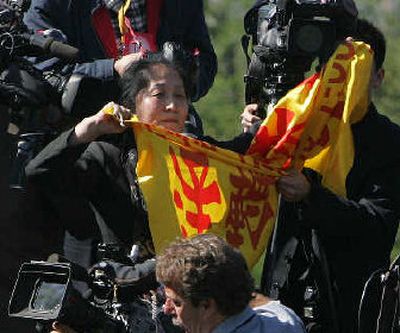No agreements for Bush, Hu

WASHINGTON – With a 21-gun salute and an array of military honor guards, President Bush welcomed President Hu Jintao of China to the White House for an hourlong meeting and a ceremonial lunch, but they had little tangible to show for a meeting marred by protest on the South Lawn.
The chief executives of the world’s greatest economic power and the world’s fastest-growing economy had much to discuss in private – the undervaluing of the Chinese currency that intensifies a trade imbalance between the two nations, the buildup of the Chinese military, denial of human rights in China and a mutual concern about the nuclear ambitions of North Korea and Iran.
The fact that the two leaders had scant progress to cite after their meeting is emblematic of the strain that permeates U.S.-Chinese relations, and it is likely to spur new interest among members of Congress already pursuing trade sanctions against China, according to American experts on U.S.-Chinese relations.
The White House had signaled before Thursday’s meeting that no significant agreements would emerge. And the pomp that the Chinese president had sought as part of a grand White House reception was undermined by a Chinese-American protester shouting an objection to religious persecution in China from a news camera platform.
Among the biggest irritants between the two nations is a U.S. trade deficit with China that has exceeded $200 billion. Central to that deficit is China’s insistence on pegging its currency to the American dollar, which allows the yuan to trade 20 percent to 40 percent below its actual value.
Allowing the yuan to float, experts say, could help alleviate a trade deficit in which U.S. imports from China are six times greater than U.S. exports there.
“The issue that overrides, and in a sense frames, the whole economic relationship is the trade imbalance,” said C. Fred Bergsten, director of the Institute for International Economics. “The failure of China to permit its currency to move, as most other countries in the world are doing, leads to a major protectionist trade reaction here in the United States.”
Bergsten, co-author of “China: The Balance Sheet,” added, “Congress is saying, ‘Well, if they continue to insist on an unfair trade competitive advantage by blocking a rise in the value of the currency, the only thing we can do, more in sorrow than in anger, is to hit them with trade restrictions.’ “
The one point Bush and Hu agreed on publicly was the importance of improving the relationship between the U.S. and China, a nation of 1.3 billion whose economy is growing 10 percent a year.
“The United States and China are two nations divided by a vast ocean, yet connected through a global economy that has created opportunity for both our peoples,” Bush said in his welcoming.
Behind the scenes, according to one senior administration official, Bush pressed Hu on “the issue of inflexibility” in China’s insistence on controlling the relative world value of its currency.
“We don’t agree on everything,” Bush said while taking questions with Hu in the Oval Office from a small group of reporters. “But we’re able to discuss our disagreements in a spirit of friendship and cooperation.”
Hu, citing broad agreement on “common strategic interests,” said, “As for the differences or even frictions between the two countries … we both believe that they may be properly resolved through consultations on an equal footing.”
Asked why he has been unable to persuade China to quickly revalue its currency, Bush offered an uncharacteristically terse comment. “There has been some appreciation in the currency,” he said. “We would hope there would be more appreciation in the currency.”
Both leaders had a moment of discomfort when a woman given credentials by a newspaper affiliated with Falun Gong, a religious group banned in China, called out her protest from the press camera platform.
“President Bush, stop him from killing!” shouted the woman, identified by her newspaper as Wang Wenyi, a pathologist and Falun Gong practitioner.
“You’re OK,” Bush told Hu, encouraging him to continue his remarks as the woman yelled. Hu did so, saying, “The Chinese people have always cherished good will toward the American people.”
Secret Service agents removed Wenyi from the White House grounds, and she was charged with disorderly conduct, a spokesman said. National Security Adviser Council Stephen Hadley said Bush later apologized to Hu for the incident.